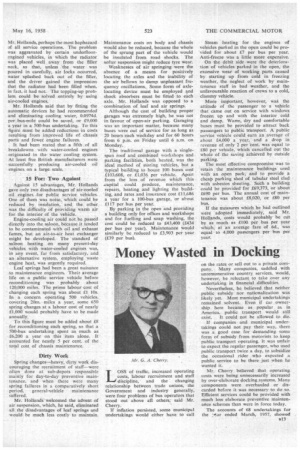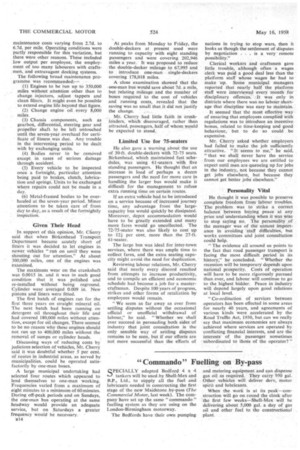Money Wasted in Docking
Page 47

Page 48

If you've noticed an error in this article please click here to report it so we can fix it.
LOSS of traffic, increased operating costs, labour recruitment and staff discipline, and the changing relationship between trade unions, the Government and industry generally, were four problems of bus operators that stood out above all others; said Mr. Cherry.
If inflation persisted, some municipal undertakings would either have to call on the rates or sell out to a private company. -Many companies, saddled with unremunerative country services, would, however, be reluctant to take over any undertaking in financial difficulties.
Nevertheless, he believed that neither public subsidy nor nationalization was likely yet. Most municipal undertakings remained solvent. Even if Car ownership here became as popular, as in America. public transport would still
exist. It could not be allowed to die.
If companies and municipal undertakings could not pay their way, there was a good case for demanding some form of subsidy from motorists to keep public transport operating. It was unfair to expect the regular passenger, who used public transport twice a day, to subsidize the occasional rider who expected a public service to be there just when he wanted it.
Mr. Cherry believed that operating costs were being unnecessarily increased by over-elaborate docking systems. Many components were overhauled or discarded before it was necessary to do so. Efficient services could be provided with much less elaborate preventive maintenance schemes than were in force today.
The accounts of 68 undertakings for the -star ended March, 1957, showed maintenance costs varying from 2.7d. to 6.7d. per mile, Operating conditions were partly responsible for this variation, but there were other reasons. These included low output per employee, the employment of too many labourers with craftsmen, and extravagant docking systems.
The following broad maintenance programme was recornmendecl: (1) Engines to be run up to 350,000 miles without attention other than to change injectors, adjust tappets and clean filters, It might even be possible to extend engine life beyond that figure.
(2) Change engine oil every 8,000 miles.
(3) Chassis components, such as gearbox, differential, steering gear and propeller shaft to be left untouched until the seven-year .overhaul for certificate of fitness was due. Any trouble in the intervening period to be dealt with by exchanging units.
(4) Bodies never to beremoved except in eases of serious darnage through accident.
(5) Every vehicle to be inspected once a fortnight, particular attention being paid to brakes, clutch, lubrication and springs. Units to be exchanged where repairs could not be made in a day.
(6) Metal-framed bodies to be overhauled at the seven-year period. Minor attentions to be taken care of from day to day, as a result of the fortnightly inspection.
Given Their Head In support of this opinion, Mr. Clierry said that when Birkenhead Transport
Department became acutely short of fitters it was decided to let engines in newer Vehicles "run on until they were shouting out for attention." At about 300,000 miles, one of the engines was examined.
The maximum wear on the crankshaft was 0.0015 in. and it was in such good condition that it was polished and re-installed without being reground, Cylinder wear averaged 0.009 in. New pistons and liners were fitted.
The first batch of engines ran for the first three years on straight mineral oil.
The next batch had been running on detergent oil throughout their life and had covered 180,000 miles without atten tion, except for oil changes. There seemed to be no reason why these engines should not run up to 400,000 miles without the removal of sumps or cylinder heads. .
Discussing ways of reducing costs by judicious selection of vehicles, Mr. Cherry said it was doubtful whether 5 per cent. of routes in industrial areas, as served by municipalities, could be operated satisfactorily by one-man buses.
A large municipal undertaking had selected four routes which appeared to lend themselves to one-man working. Frequencies varied from a maximum of eight minutes to a minimum of 60 minutes. During off-peak periods and on Sundays, the one-man bus operating at the same headway would provide an adequate service, but on Saturdays a greater frequency would be necessary_ al 4 At peaks from Monday to Friday, the double-deckers at present used were running to capacity with eight standing passengers and were covering 202,946 miles • a year. It was proposed to reduce the double-decker mileage to 67,995 and to introduce one-man single-deckers covering 178,018 miles.
A close examination showed that the one-man bus would save about 7d. a mile, but relating mileage and the number of buses required to the cost of vehicles and running costs, revealed that the saving was so small that it did not justify the change.
Mr. Cherry had little faith in crushlOaders, which discouraged, rather than • attracted, passengers, half of whom would be expected to stand.
Limited Use for 75-seaters
He also gave a warning about the use of 30-ft. doubleedeckers with 72-75 seats. Birkenhead, which maintained fast schedules, was using 61-seaters with five standing passengers. He thought that an increase in load of perhaps a dozen passengers and the need for more care in handling the larger bus would make it difficult for the management to refuse extra running time on certain routes.
If an extra vehicle had to be introduced on a service because of increased journey time, any advantage from the largecapacity bus would quickly be dissipated. Moreover, depot accommodation would have to be greatly extended and many more fares would go uncollected. The 72-75-seater was also likely to cost up to 121 per cent, more than the 27-ft. 61-seater.
The large bus was ideal for inter-town services, where there was ample time to collect fares, and the extra seating capacity might avoid the need for duplication.
Reviewing tabour relations, Mr. Cherry said that nearly every discord resulted from attempts to increase productivity, and to compile an efficient and economic schedule had become a job for a mastercraftsman. Despite 100 years of progress, strikes and other forms of retaliation by employees would remain.
"We seem as far away as ever from settling disputes without the occasional official or unofficial withdrawal of labour," he said. "Whether we shall ever succeed in persuading both sides of industry that joint consultation is the only sensible way of settling disputes remains to be seen, but if our efforts are not more successful than the efforts of
nations in trying to stop wars, then it looks as though the settlement of disputes
by negotiation . . is a very remote possibility."
Clerical workers and craftsmen gave little trouble, although often a wages clerk was paid a good deal less than the platform staff whose wages he had to make up. Some municipal managers reported that nearly half the platform staff were interviewed every Month • for disciplinary offenees.' -It was only in districts where there was no labour shortage that discipline was easy to maintain.
• It seemed that the most effective way of ensuring that employees complied With regulations was to introduce an incentive bonus, related to time-keeping and good behaviour, but to do so could be expensive.
Mr. Cherry asked whether employers had failed. to make the job sufficiently attractive. " 1t seemsto me," he said, "that we shall never have the service from our employees we are entitled to expect until men are queueing up for jobs in the industry, not because they cannot get jobs elsewhere, but because they cannot get better jobs elsewhere."
Personality Vital
He thought it was possible to preserve complete freedom from labour troubles. The problem was to strike a correct balance between buying peace at any price and understanding when it was wise to stop saying no. The personality of the manager was of the utmost imPortance in avoiding 'staff difficulties, but works committees and joint consultation could help.
"The evidence all around us points to the fact that road passenger transport is facing the most difficult period in its history," he concluded. "Whether •the recession Will be temporary depends upon national prosperity. Costs of operation will have to be more rigorously pursued than ever, and tabour will continue to go to the highest bidder. Peace in industry will depend largely upon good relations at local level.
"Co-ordination of services between operators has been effected in some areas for nearly 40 years, and agreements of various kinds were accelerated by the Road Traffic Act, 1930, but can we really
• say that maximum economies are always achieved where services are operated by conflicting financial interests, and are the interests of the passenger sometimes subordinated to thoie of the operator?"




































































































